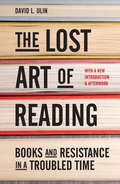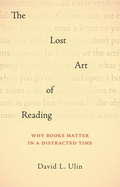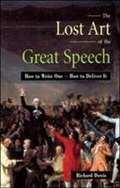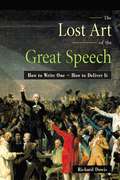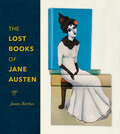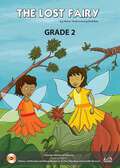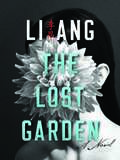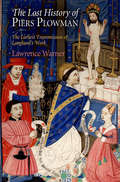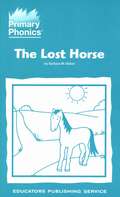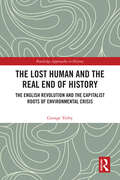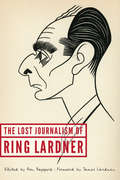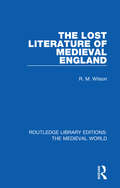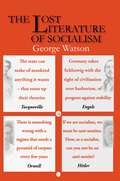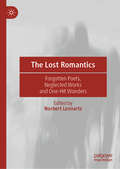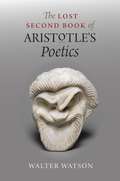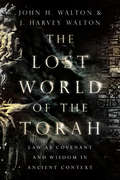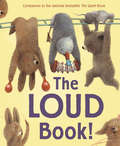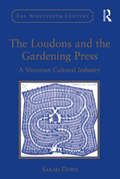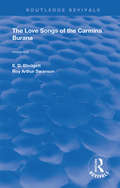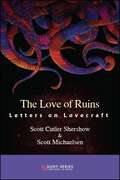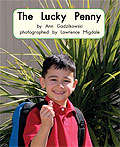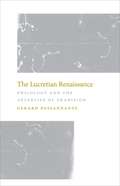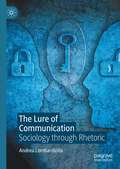- Table View
- List View
The Lost Art of Reading: Books and Resistance in a Troubled Time
by David L. UlinThe new introduction and afterword bring fresh relevance to this insightful rumination on the act of reading--as a path to critical thinking, individual and political identity, civic engagement, and resistance.The former LA Times book critic expands his short book, rich in ideas, on the consequence of reading to include the considerations of fake news, siloed information, and the connections between critical thinking as the key component of engaged citizenship and resistance. Here is the case for reading as a political act in both public and private gestures, and for the ways it enlarges the world and our frames of reference, all the while keeping us engaged.
The Lost Art of Reading: Why Books Matter in a Distracted Time
by David L. UlinReading is a revolutionary act, an act of engagement in a culture that wants us to disengage. In The Lost Art of Reading, David L. Ulin asks a number of timely questions - why is literature important? What does it offer, especially now? Blending commentary with memoir, Ulin addresses the importance of the simple act of reading in an increasingly digital culture. Reading a book, flipping through hard pages, or shuffling them on screen - it doesn't matter. The key is the act of reading, and it's seriousness and depth. Ulin emphasizes the importance of reflection and pause allowed by stopping to read a book, and the accompanying focus required to let the mind run free in a world that is not one's own. Are we willing to risk our collective interest in contemplation, nuanced thinking, and empathy? Far from preaching to the choir, The Lost Art of Reading is a call to arms, or rather, to pages.
The Lost Art of the Great Speech: How to Write It, How to Deliver It
by Richard DowisThis authoritative speech-writing guide covers every essential element of a great speech, with excerpts from some of history's most memorable speeches.
The Lost Art of the Great Speech: How to Write One--How to Deliver It
by Richard DowisLearn how to give powerful, on-target speeches that capture an audience's attention and drive home a message.Splashy slides, confident body language, and a lot of eye contact are fine and well. However, if a speech is rambling, illogical, or just plain boring, the impact will be lost. The key is not just in the delivery techniques, but in tapping into the power of language.Prepared by award-winning writer and journalist Richard Dowis, The Lost Art of the Great Speech covers every essential element of a great speech, including:outlining and organizing,beginning with a bang,making use of action verbs and vivid nouns,and handling questions from the audience.Plus, this authoritative speech-writing guide includes excerpts from some of history's most memorable speeches--eloquent words to contemplate and emulate. Discover how to not only write a great speech, but also how to deliver it even better.
The Lost Books of Jane Austen
by Janine BarchasHardcore bibliography meets Antiques Roadshow in an illustrated exploration of the role that cheap reprints played in Jane Austen's literary celebrity—and in changing the larger book world itself.Gold Winner of the 2019 Foreword INDIES Award for History by FOREWORD ReviewsIn the nineteenth century, inexpensive editions of Jane Austen's novels targeted to Britain's working classes were sold at railway stations, traded for soap wrappers, and awarded as school prizes. At just pennies a copy, these reprints were some of the earliest mass-market paperbacks, with Austen's beloved stories squeezed into tight columns on thin, cheap paper. Few of these hard-lived bargain books survive, yet they made a substantial difference to Austen's early readership. These were the books bought and read by ordinary people. Packed with nearly 100 full-color photographs of dazzling, sometimes gaudy, sometimes tasteless covers, The Lost Books of Jane Austen is a unique history of these rare and forgotten Austen volumes. Such shoddy editions, Janine Barchas argues, were instrumental in bringing Austen's work and reputation before the general public. Only by examining them can we grasp the chaotic range of Austen's popular reach among working-class readers. Informed by the author's years of unconventional book hunting, The Lost Books of Jane Austen will surprise even the most ardent Janeite with glimpses of scruffy survivors that challenge the prevailing story of the author's steady and genteel rise. Thoroughly innovative and occasionally irreverent, this book will appeal in equal measure to book historians, Austen fans, and scholars of literary celebrity.
The Lost Duck (Primary Phonics #Set 3 Book 9)
by Barbara W. MakarA systematic, phonics-based early reading program that includes: the most practice for every skill, decodable readers for every skill, and reinforcement materials--help struggling students succeed in the regular classroom
The Lost Fairy class 2 - MIE
by Helina Hookoomsing-Dookhee"The Lost Fairy," penned by Hélina Hookoomsing Dookhee, spins a tale about two playful fairies, Shaylee and Shayla, frolicking in the woods until they doze off in an empty bird's nest. When Shaylee awakens, she finds herself alone and sets off on a quest to find her missing sister, encountering various woodland creatures along the way. Shaylee's search involves questioning a butterfly, a rabbit, a gnome, and even a little witch, all yielding no success until a perceptive little boy helps reunite the sisters. It turns out Shayla was hiding and following Shaylee all along. The story culminates in a heartfelt moment of reconciliation as Shayla apologizes for causing worry, promising not to hide again. Through enchanting illustrations and engaging narrative, this big book not only captures the adventure of the two fairies but also imparts lessons about companionship, honesty, and the joy of reunion, making it an ideal literary tool for Grade 2 English sessions, fostering comprehension and storytelling skills among young readers.
The Lost Garden: A Novel (Modern Chinese Literature from Taiwan)
by Ang LiThe Lost Garden is an eloquent portrait of the losses incurred as we struggle to hold on to our passions. The novel begins with the family of Zhu Yinghong, whose father, Zhu Zuyan, was imprisoned in the early days of Chiang Kai-shek's rule. Zhu Zuyan spends his days luxuriating in his Lotus Garden, which he builds according to his own desires. Forever under suspicion, he indulges as much as he can in circumscribed pleasures, though they drain the family fortune. Eventually the entire household is sold, including the Lotus Garden. The novel then swings to modern-day Taipei, where Zhu Yinghong falls for Lin Xigeng, a real estate tycoon and playboy. Their cat-and-mouse courtship builds against the extravagant banquets and decadent entertainments of Taipei's wealthy businessmen. Though the two ultimately marry, their high-styled romance dulls over time, leading to a dangerous, desperate quest to reclaim the enchantment of the Lotus Garden.
The Lost History of "Piers Plowman": The Earliest Transmission of Langland's Work (The Middle Ages Series)
by Lawrence WarnerDespite the recent outpouring of scholarship on Piers Plowman, Lawrence Warner contends, we know much less about the poem's production, transmission, and readership than one might think. When did William Langland write each of the three versions of the poem, and when did they enter wide circulation? What role did scribes and other agents play in these processes? The Lost History of "Piers Plowman" engages with these questions to bring about a fundamental shift in our understanding of the genesis and development of the Middle English poem.According to received history, the poem exists in three distinct, chronological versions, the A, B, and C texts, with most scholars agreeing that Langland completed the B text—the version most familiar to modern readers—around 1377-78. Challenging much of the prevalent wisdom about the poem, Warner argues that the received B text is not an integral poem aligned with a single author but, rather, two groups of manuscripts, each of which, because of scribal activities, takes on varying amounts of what we now call C version matter. Through close textual analysis, he reveals that the B text is a conflation of an ur-B text with a collection of passages that belong to the C version of circa 1390, demonstrating that the circulation of the C text actually predates that of the B.The Lost History of "Piers Plowman" is a groundbreaking and provocative work that establishes an entirely new paradigm for the study of one of the central works of Middle English literature. It will be of interest to scholars and students of textual studies, editorial theory, and medieval history.
The Lost Human and the Real End of History: The English Revolution and the Capitalist Roots of Environmental Crisis (Routledge Approaches to History)
by George YerbyThis book analyses the transformation in 16th- and 17th- century English economic life that overturned the traditional restraints of the medieval economy for the commercial ethos that governs the modern world, and the resulting imbalance which opened the way to the environmental breakdown of today.On the open fields and commons, the smallholders had worked closely with the land as given, with minimal intervention in natural processes. The 16th century introduced a fundamental difference of approach as the inducement of exceptional profits encouraged manipulative exploitation of the land. “Freedom of trade” from arbitrary restraints and impositions became the new economic ethos, officially established by the mid-17th-century revolution and reinforced by other changes such as the emergence of the nationstate. The “rise of science” was associated with the agriculturalist adoption of empirical method for “improvement”, and a new philosophy accorded humankind the right to degrade other species for its own ends. By focusing on the causes and effects of capitalism at its first appearance, this volume traces the environmental crisis back to the switch from an essentially universalist to a basically individualist world.This book will be of interest to scholars and students of Early Modern England, Economic Studies, and Environmental Studies.
The Lost Journalism of Ring Lardner
by James Lardner Ron Rapoport Ring LardnerRing Lardner’s influence on American letters is arguably greater than that of any other American writer in the early part of the twentieth century. Lauded by critics and the public for his groundbreaking short stories, Lardner was also the country’s best-known journalist in the 1920s and early 1930s, when his voice was all but inescapable in American newspapers and magazines. Lardner’s trenchant, observant, sly, and cynical writing style, along with a deep understanding of human foibles, made his articles wonderfully readable and his words resonate to this day. Ron Rapoport has gathered the best of Lardner’s journalism from his earliest days at the South Bend Times through his years at the Chicago Tribune and his weekly column for the Bell Syndicate, which appeared in 150 newspapers and reached eight million readers. In these columns Lardner not only covered the great sporting events of the era—from Jack Dempsey’s fights to the World Series and even an America’s Cup—he also wrote about politics, war, and Prohibition, as well as parodies, poems, and penetrating observations on American life.The Lost Journalism of Ring Lardner reintroduces this journalistic giant and his work and shows Lardner to be the rarest of writers: a spot-on chronicler of his time and place who remains contemporary to subsequent generations.
The Lost Literature of Medieval England (Routledge Library Editions: The Medieval World #54)
by R. M. WilsonOriginally published in 1952 The Lost Literature of Medieval England provides an account of lost masterpieces of medieval English literature. The book examines the evidence for their existence and pieces together a fuller understanding of the literary traditions of the period. In more specific detail, the book looks at the concept of Christian epics and religious and didactic literature, as well as the drama and the lyrical poetry of the period.
The Lost Literature of Socialism (2nd edition)
by George WatsonIn his hard-hitting and controversial book, George Watson examines the foundation texts of socialism to find out what they really say; the result is blasphemy against socialism's canon of saints. Marx and Engels publicly advocated genocide in 1849; Ruskin called himself a violent Tory and a King's man; and Shaw held the working classes in utter contempt. Drawing on an impressive range of sources from Robert Owen to Ken Livingstone, the author demonstrates that socialism was a conservative, nostalgic reaction to the radicalism of capitalism, and not always supposed to be advantageous to the poor. There have even been socialist monarchs - Napoleon III was one. Two chapters of the book study Hitler's claim that 'the whole of National Socialism' was based on Marx, and bring to light the common theoretical basis of the beliefs of Stalin and Hitler which led to death camps. As a literary critic, George Watson's concern is to pay proper respect to the works of the founding fathers of socialism, to attend to what they say and not what their modern disciples wish they had said. The dust grows thick on many of these tomes, while present-day socialists follow a few ossified slogans plucked selectively from the best-known books. Socialist ideas are now rescued from priggish and woolly-thinking moralists so that genuine debate can be revived. This invigorating book forces the reader to abandon long-standing assumptions in political thought. It is certain to ruffle feathers, blue as well as red.
The Lost Romantics: Forgotten Poets, Neglected Works and One-Hit Wonders
by Norbert LennartzThis book features a collection of essays, shedding subversively new light on Romanticism and its canon of big-six, white, male Romantics by focusing on marginalised, forgotten and lost writers and their long-neglected works. Probing the realms of literary and cultural lostness, this book identifies different strata of oblivion and shows how densely the net of contacts and rivalries was woven around the ostensibly monolithic stars of the Romantic age. It reveals how the lost poets inspired the production of anthologised poetry, that they served as indispensable muses, sidekicks and interlocutors of the big six and that their relevance for the literary scene has been continuously underrated. This is also surprisingly true for some creators of famous one-hit wonders (Frankenstein, The Vampyre) who were suddenly rocketed to fame or notoriety, but could not help seeing their other works of fiction turning into abortive flops.
The Lost Second Book of Aristotle's Poetics
by Walter WatsonAristotle&’s lost wisdom on comedy and catharsis come to life in this philosopher&’s interpretation of recovered ancient writings.Aristotle&’s Poetics was the first philosophical treatise to propound a theory of literature. But we know that what remains of this important text is incomplete. In the existing material, Aristotle tells us that he will speak of comedy, address catharsis, and give an analysis of what is funny—but these promised chapters are missing. Now, philosopher Walter Watson offers a new interpretation of the lost second book of Aristotle&’s Poetics. A document known as the Tractatus Coislinianus, first recovered in the Biblioteque Nationale in Paris in 1839, appears to be a summary of Aristotle&’s second book. Based on Richard Janko&’s philological reconstruction, Watson mounts a compelling philosophical argument that gives revealing context to this document and demonstrates its hidden meanings. Watson renders lucid and complete explanations of Aristotle&’s ideas about catharsis, comedy, and a summary account of the different types of poetry, ideas that influenced not only Cicero&’s theory of the ridiculous, but also Freud&’s theory of jokes, humor, and the comic. Here, at last, Aristotle&’s lost second book is found again.
The Lost Wallet (Primary Phonics #Set 5 Book 7)
by Barbara W. MakarA systematic, phonics-based early reading program that includes: the most practice for every skill, decodable readers for every skill, and reinforcement materials--help struggling students succeed in the regular classroom
The Lost World of the Torah: Law as Covenant and Wisdom in Ancient Context (The Lost World Series #Volume 6)
by John H. Walton J. Harvey WaltonOur handling of what we call biblical law veers between controversy and neglect. On the one hand, controversy arises when Old Testament laws seem either odd beyond comprehension (not eating lobster) or positively reprehensible (executing children). On the other, neglect results when we consider the law obsolete, no longer carrying any normative power (tassels on clothing, making sacrifices). Even readers who do attempt to make use of the Old Testament "law" often find it either irrelevant, hopelessly laden with "thou shalt nots," or simply so confusing that they throw up their hands in despair. Despite these extremes, people continue to propose moral principles from these laws as "the biblical view" and to garner proof texts to resolve issues that arise in society. The result is that both Christians and skeptics regularly abuse the Torah, and its true message often lies unheard. Walton and Walton offer in The Lost World of the Torah a restorative vision of the ancient genre of instruction for wisdom that makes up a significant portion of the Old Testament. In the ancient Near East, order was achieved through the wisdom of those who governed society. The objective of torah was to teach the Israelites to be wise about the kind of order needed to receive the blessings of God’s favor and presence within the context of the covenant. Here readers will find fresh insight on this fundamental genre of the Old Testament canon.
The Loud Book!
by Deborah Underwood Renata LiwskaBANG!CRACKLE!BOO!Just like there are lots of quiets, there are also lots of louds:Good louds(HOORAY!)and bad louds(CRASH!) And louds that make you feel like you arethe center of attention (BURP!).The Loud Book compiles all these kid-friendly noisesfrom morning to night,in a way that is sure to make readersCHEER!
The Loudons and the Gardening Press: A Victorian Cultural Industry (The Nineteenth Century Series)
by Sarah DewisThrough close readings of individual serials and books and archival work on the publication history of the Gardener’s Magazine (1826-44) Sarah Dewis examines the significant contributions John and Jane Webb Loudon made to the gardening press and democratic discourse. Vilified during their lifetimes by some sections of the press, the Loudons were key players in the democratization of print media and the development of the printed image. Both offered women readers a cultural alternative to the predominantly literary and classical culture of the educated English elite. In addition, they were innovatory in emphasizing the value of scientific knowledge and the acquisition of taste as a means of eroding class difference. As well as the Gardener’s Magazine, Dewis focuses on the lavish eight-volume Arboretum et Fruticetum Britannicum (1838), an encyclopaedia of trees and shrubs, and On the Laying Out, Planting, and Managing of Cemeteries (1843), arguing that John Loudon was a radical activist who reconfigured gardens in the public sphere as a landscape of enlightenment and as a means of social cohesion. Her book is important in placing the Loudons’ publications in the context of the history of the book, media history, garden history, urban social history, history of education, nineteenth-century radicalism and women’s journalism.
The Love Songs of the Carmina Burana (Routledge Revivals #No. 49b)
by E. D. Blodgett Roy Arthur SwansonOriginally published in 1987, this book contains the Love Songs of the Carmina Burana, alongisde a select bibliography and textual notes. The collection of poems now known as the Carmina was given its name by Schmeller in 1847, and the Carmina Burana comprises the best and most representative products of goliardism and remains the definitive manifestation of the goliardic movement.
The Love of Ruins: Letters on Lovecraft (SUNY series, Literature . . . in Theory)
by Scott Cutler Shershow Scott MichaelsenToday, H. P. Lovecraft is both more popular and controversial than ever: the influence of his "Cthulhu mythos" is everywhere in popular culture, his cosmic pessimism has reemerged as a major theme in contemporary philosophy, and his racism continues to spark controversy in the media. The Love of Ruins takes a fresh look at a figure widely acknowledged as the father of modern horror or "weird" fiction. In these pages, Lovecraft emerges not as the atheist and nihilist he is often claimed to be, but as a kind of "psychonaut" and mystic whose stories, through their own imaginative rigor, expose the intellectual bankruptcy of their author's racism. The Love of Ruins is itself written in the form of letters, in order to do homage to Lovecraft's love of the form of the personal letter (he wrote more than 100,000), and to emulate Lovecraft's lifetime practice of thinking-as-corresponding.
The Lucky Penny (Fountas & Pinnell LLI Green #Level G, Lesson 98)
by Ann GadzikowskiFountas and Pinnell Leveled Literacy Intervention Green System -- 1st Grade
The Lucretian Renaissance: Philology and the Afterlife of Tradition
by Gerard PassannanteWith The Lucretian Renaissance, Gerard Passannante offers a radical rethinking of a familiar narrative: the rise of materialism in early modern Europe. Passannante begins by taking up the ancient philosophical notion that the world is composed of two fundamental opposites: atoms, as the philosopher Epicurus theorized, intrinsically unchangeable and moving about the void; and the void itself, or nothingness. Passannante considers the fact that this strain of ancient Greek philosophy survived and was transmitted to the Renaissance primarily by means of a poem that had seemingly been lost—a poem insisting that the letters of the alphabet are like the atoms that make up the universe. By tracing this elemental analogy through the fortunes of Lucretius’s On the Nature of Things, Passannante argues that, long before it took on its familiar shape during the Scientific Revolution, the philosophy of atoms and the void reemerged in the Renaissance as a story about reading and letters—a story that materialized in texts, in their physical recomposition, and in their scattering. From the works of Virgil and Macrobius to those of Petrarch, Poliziano, Lambin, Montaigne, Bacon, Spenser, Gassendi, Henry More, and Newton, The Lucretian Renaissance recovers a forgotten history of materialism in humanist thought and scholarly practice and asks us to reconsider one of the most enduring questions of the period: what does it mean for a text, a poem, and philosophy to be “reborn”?
The Lure of Communication: Sociology through Rhetoric
by Andrea LombardiniloThis book addresses the convergence of sociology, communication and rhetoric, with particular reference to the contemporary expressive and social patterns of mass communication. Using rhetoric as a meta-conceptual apparatus for the sociology of communication, this book offers an original and comprehensive critique of historical social theory alongside 20th century communication researchers. The author demonstrates the symbiotic relationship between the rhetorical structures of the media-sphere and the new narrative formats in which cultural representation merges into social and civil observation. This book will be of interest to academics and students studying sociology, communication and cultural studies.
